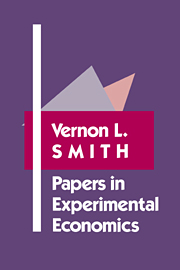Book contents
- Frontmatter
- Contents
- Preface
- Acknowledgments
- Part I The Formative Years
- Introduction
- 1 An Experimental Study of Competitive Market Behavior
- 2 Effect of Market Organization on Competitive Equilibrium
- 3 Nature, the Experimental Laboratory, and the Credibility of Hypotheses
- 4 Experimental Auction Markets and the Walrasian Hypothesis
- 5 Experimental Studies of Discrimination versus Competition in Sealed-Bid Auction Markets
- 6 Experimental Economics: Induced Value Theory
- 7 Bidding and Auctioning Institutions: Experimental Results
- 8 Intertemporal Competitive Equilibrium: An Empirical Study of Speculation
- 9 Experimental Economics at Purdue
- Part II Institutions and Market Performance
- Part III Public Goods
- Part IV Auctions and Institutional Design
- PART V Industrial Organization
- Part VI Perspectives on Economics
4 - Experimental Auction Markets and the Walrasian Hypothesis
Published online by Cambridge University Press: 06 July 2010
- Frontmatter
- Contents
- Preface
- Acknowledgments
- Part I The Formative Years
- Introduction
- 1 An Experimental Study of Competitive Market Behavior
- 2 Effect of Market Organization on Competitive Equilibrium
- 3 Nature, the Experimental Laboratory, and the Credibility of Hypotheses
- 4 Experimental Auction Markets and the Walrasian Hypothesis
- 5 Experimental Studies of Discrimination versus Competition in Sealed-Bid Auction Markets
- 6 Experimental Economics: Induced Value Theory
- 7 Bidding and Auctioning Institutions: Experimental Results
- 8 Intertemporal Competitive Equilibrium: An Empirical Study of Speculation
- 9 Experimental Economics at Purdue
- Part II Institutions and Market Performance
- Part III Public Goods
- Part IV Auctions and Institutional Design
- PART V Industrial Organization
- Part VI Perspectives on Economics
Summary
This study reports on a block of experimental market sessions designed primarily to provide (1) the severest test yet attempted of the equilibrating forces operating in competitive auction markets and (2) a more rigorously controlled test of the Walrasian hypothesis. Some data are also supplied which show the effect of cash payoffs on the equilibrating behavior of such markets; in particular, the effect of full cash payoffs to all successful trading subjects as against payoffs to a subset of such subjects chosen at random.
EXPERIMENTAL DESIGN AND SUBJECTS
The supply and demand conditions underlying the experimental design in this study were intentionally unconventional. In each experimental session, each of eleven subject buyers could purchase at most one unit of the fictitious commodity per trading period at a price not to exceed the limit price $4.20. Therefore, the demand per unit of time, or trading period, was perfectly elastic at $4.20 up to the maximum demand quantity of eleven units. In each session each subject seller could sell at most one unit of the commodity at any price not below the given minimum reservation price $3.10. There were thirteen such sellers in two experimental sessions, sixteen in two additional experimental sessions, and nineteen in the final two markets. Therefore, the supply per trading period was perfectly elastic up to the maximum supply quantities of thirteen, sixteen, and nineteen units, respectively, in the three experimental treatments.
- Type
- Chapter
- Information
- Papers in Experimental Economics , pp. 64 - 70Publisher: Cambridge University PressPrint publication year: 1991



